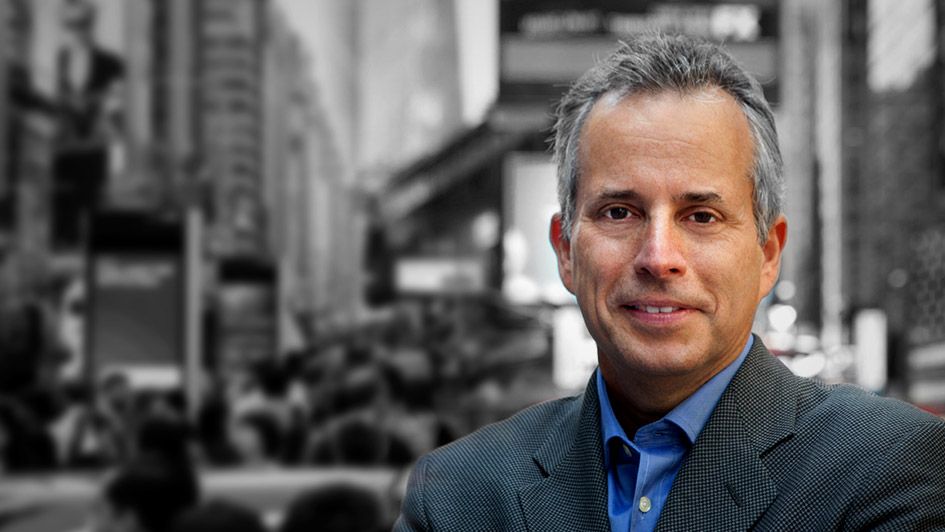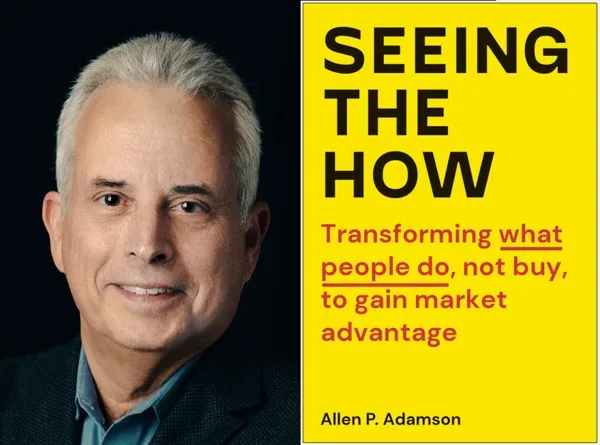Retail Royalty: Marketing Lessons from Allen Adamson, Branding Expert and Best-Selling Author
If you’re interested in branding, marketing and business strategy, you’ve probably heard of branding expert and best-selling author Allen Adamson.

If you’re interested in branding, marketing and business strategy, you’ve probably heard of branding expert and best-selling author Allen Adamson.
Allen has spent the past three decades working with the world’s leading brands, including Unilever, Ogilvy and NYU, helping them to rethink their approach to marketing, understand customer behavior and achieve incredible growth.
In his latest book, Seeing The How, Allen uncovers the power of seeing the world with fresh eyes, and explores how reimagining customer experiences can drive enormous market success - just like we’re doing here at ReturnQueen! Along the way, he sprinkles in plenty of astonishing real-life examples from some of our favorite brands.

Last week, our founders Daphna Englard and Dasya Katz were excited to sit down with Allen and hear him share even more pearls of marketing wisdom. And for this month’s installment of our Retail Royalty series, we’re excited to share these valuable insights with you too!

Read on for an eye-opening conversation with one of the greatest minds in marketing:
Hey, Allen! We loved your new book and especially your message about how everything in business can be improved by looking at opportunities through a fresh new lens. Would you say that was the main message of the book?
Yes! The purpose of my book is to encourage business starters, entrepreneurs and marketers to realize that there are opportunities to solve customers’ problems all around us, and the trick is to notice them before others do.
The problem we have today is that although business opportunities are all around us, most of us don’t see them. We’re so used to the way things are that we don't think about how they could possibly be different.
For example, when my child was younger, we would walk down the street and he would stop me to point out a cool car or building. He was seeing the world with fresh eyes and noticing things that I had long tuned out of while walking along that street. I think most of us are like that - not just in our everyday life, but also in business.
If you want to find business opportunities, you’ve got to start looking at the market differently, because otherwise you won’t spot them.
That’s an awesome perspective! The digital era has definitely brought about a lot of opportunity, as well as disruption in the world of marketing. How do you see the rise of social media affecting customer behavior?
So much of marketing comes down to social media today because word of mouth is - and always has been - important. Back in the day, you used to ask your neighbor who they’d recommend for cutting the grass. It’s the same with social media - we look to others for advice and recommendations.
What’s different is that people on social media don’t tend to share the ordinary. People share extraordinarily good things and extraordinarily bad things online. This means that if a business wants to get noticed and talked about on social media, they have to do something out of the ordinary. It’s about finding ways to solve problems that make people say, “Wow, I’ve got to share this with my friends.”
Can you share any examples of companies which have done this well?
A couple of weeks ago, Delta Air Lines announced that their app will tell you exactly how many minutes it will take to get to your gate. This new feature uses Waze to factor in everything from the line at the TSA to how far your gate is from where you’re standing. Why is that important? Because even though Delta’s main job is to get you to your destination safely once you’re on the plane, they’ve zoomed out and thought about how they can make passengers really want to fly with them above their competitors.
That’s a good example of a business and team of marketers going the extra mile and thinking about not just what they’re responsible for (giving passengers a pleasant and safe flight) but how they can make the product fit better into their lives overall. They created an extraordinary and shareable experience.
So when your product is helping customers do one thing, it’s worth thinking through other things in their life they may need help with in that same area. You also have to realize that just because you solved their problem today, it doesn’t mean you’re going to solve it tomorrow, because things change. Businesses are in the habit of saying “I’ve solved it!”, but actually the pace of change is so fast that you need to be constantly paranoid that every day your offer is less relevant than it was the day before. And if you’re not really watching your customer, then you’re in trouble.
Absolutely. At ReturnQueen, we saw an opportunity for change as we noticed that the full returns experience was more stressful than it needed to be. We set out to simplify the process and transform the way that people approach their returns. You’ve mentioned that you saw this was a major problem when you visited your daughter’s college too! Can you please tell us more about that?
When I went to visit my daughter’s college, I was struck by the mountain of packages stacked outside the front door of the building - and also by the amount of boxes they were throwing away. I asked her and her friends how they returned their packages, and they explained that it was quite an impossible process. They didn’t have a printer, so they had to go to the post office, but they didn’t have a car to get there. On top of all that, they had to spend a lot of time keeping track of what they’ve kept and returned, and when their refunds would be coming in. I think you’ve tapped into a great opportunity with ReturnQueen, by seeing the problem through college students’ and busy young people’s eyes, and making returns far quicker and easier for them. It’s a huge deal, but it’s a problem they might not have even consciously realized needed solving!
To find these opportunities, you have to look beyond the surface and view a situation with fresh eyes. That may mean looking at an existing category where everything seems to be fine, and where 9 out of 10 people won’t report having a problem, but then streamline the process and find a way to make it easier and faster for people to do the things they need to do.
Absolutely! And we find that the more people that use ReturnQueen, the more they realize how much time they’ve been wasting on returns. How do you educate the consumer on a need they don’t know that they have? You gave AirBnB as an example in your book - people never considered that they could stay in a stranger’s house before, so they never looked for it before AirBnb.
It’s really hard to change human behaviors. Typically, you have to identify specific people that would find a product or service more valuable. I am reminded of the Peloton story here. Peloton was founded because the founder’s wife was super organized and would always book her spin classes on time each week. On the other hand, he would be late to sign up and would miss out on all the sessions he wanted by not booking in advance. So he solved the problem for himself by building a machine that let him spontaneously do the spin class he wanted whenever he wanted!
It’s about defining your audience to see who this would benefit more than others - the people who want a spontaneous workout, for example, rather than the super organized crowd who have no problem signing up for workouts outside of their home.
In your experience working with different companies from the marketing side, did you ever have a ‘wow’ or ‘pinch me’ moment where you were able to see something very differently in a company that you worked with?
I worked on a project with the Central Park Conservancy many years ago to improve the trash bins in Central Park. We were designing recycling bins and other types of bins to help keep the park cleaner. One of the things that they had figured out as part of this was that people will take better care of the park if they feel it’s like their backyard. That was the customer insight. It goes back to a quote that the columnist Thomas Friedman wrote a long time ago that “no one washes a rental car”. If you own a car, you’ll take care of it.
So, the conservancy split the park into lots of ‘zones’ (rather than having one big park) which became like personal “backyards” with one person mainly responsible for that area. That person not only pruned the trees and watered the flowers, but took out the trash and everything else in that zone. So now when someone was walking in the park, they knew they were in “Susan’s section”, and so would think twice before dropping a can on the ground. You get to know those people and all of a sudden the park didn’t seem like a big impersonal park but lots of little gardens, which you can see the owners tending to. But if you’d asked someone how to solve the litter problem, they probably wouldn’t have said this initially. Businesses need to find out how people feel about a certain category, because - as I’ve said before - they won’t always tell you!
That’s an amazing story! You have so many insights and different ways of looking at things. Finally, can we end with your advice for businesses on how to stay current and succeed in this market?
Execution matters. Every day, think about how you can make your product a little better, and how you can make life a little easier for your customers, because other people will get in the market and do the same thing, and then the big players will start following you. So use the time you're the first to invest in figuring out how you’re going to stay the first. Lots of startups get it right then the big players catch on. So it’s important to keep iterating.
You have to look at every day as an opportunity to start fresh. Don’t just think the same approach will work year on year, and never say “if it ain’t broke, don’t fix it”. This will put you out of business!
Finally, make sure you surround yourself with skeptics who aren’t afraid to tell you you’re wrong or that something is a bad idea. The greater the success, the greater the arrogance, and the greater the number of yes-people that surround you. You need people around you who aren’t afraid to be honest and skeptical, and will help you see things with fresh eyes! That’s the real key to marketing success.
We hope you learned as much as we did from our inspiring chat with Allen!
Be sure to buy his new book Seeing The How if you’re interested in finding out more about how to view business opportunities through a fresh new lens. And free up more of your time to read Allen’s book by downloading the ReturnQueen app, so we can take your returns off your hands!
Finally, don’t miss Allen's recent article in Forbes, where he talks about how ReturnQueen is noticing and seizing real opportunity by “wholly reinventing” the returns experience.

